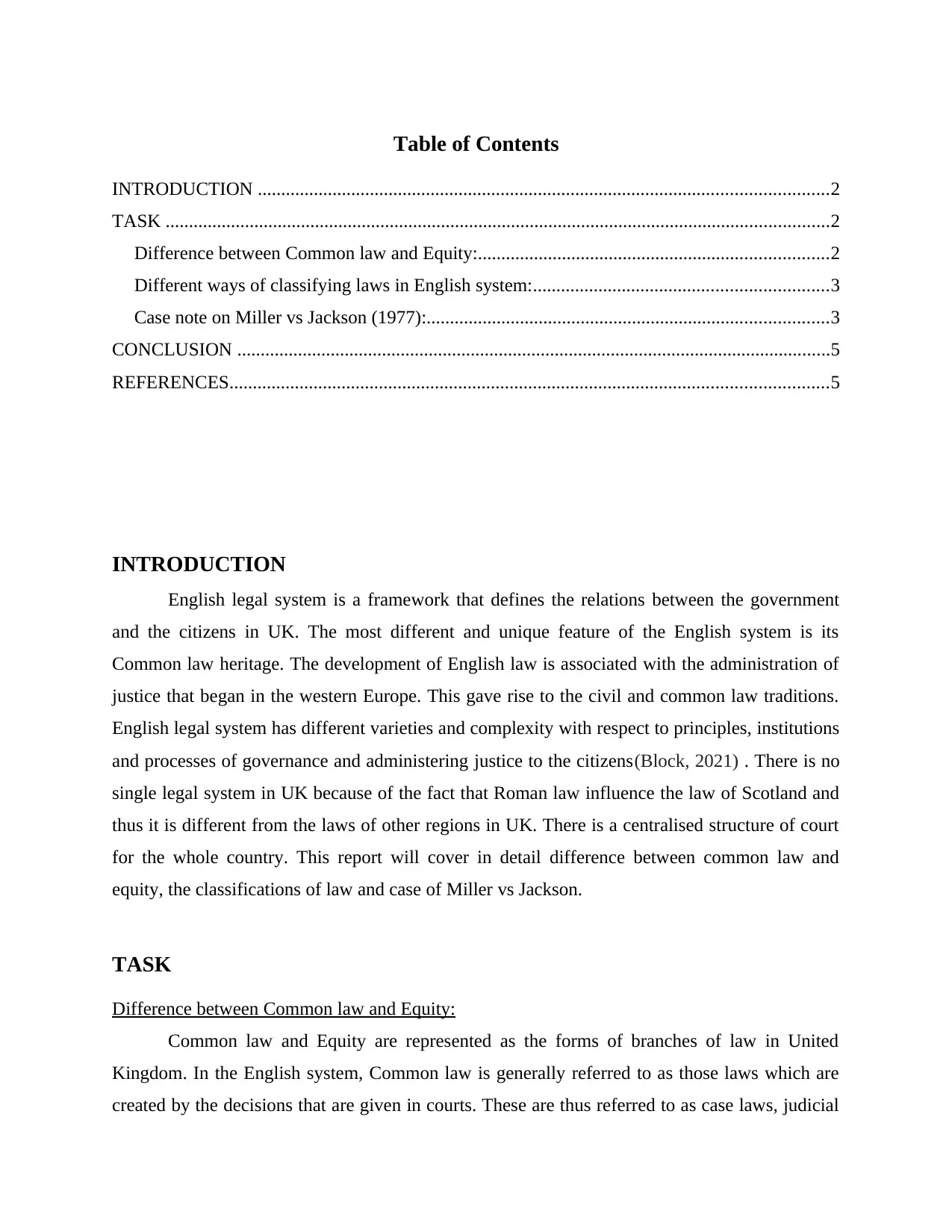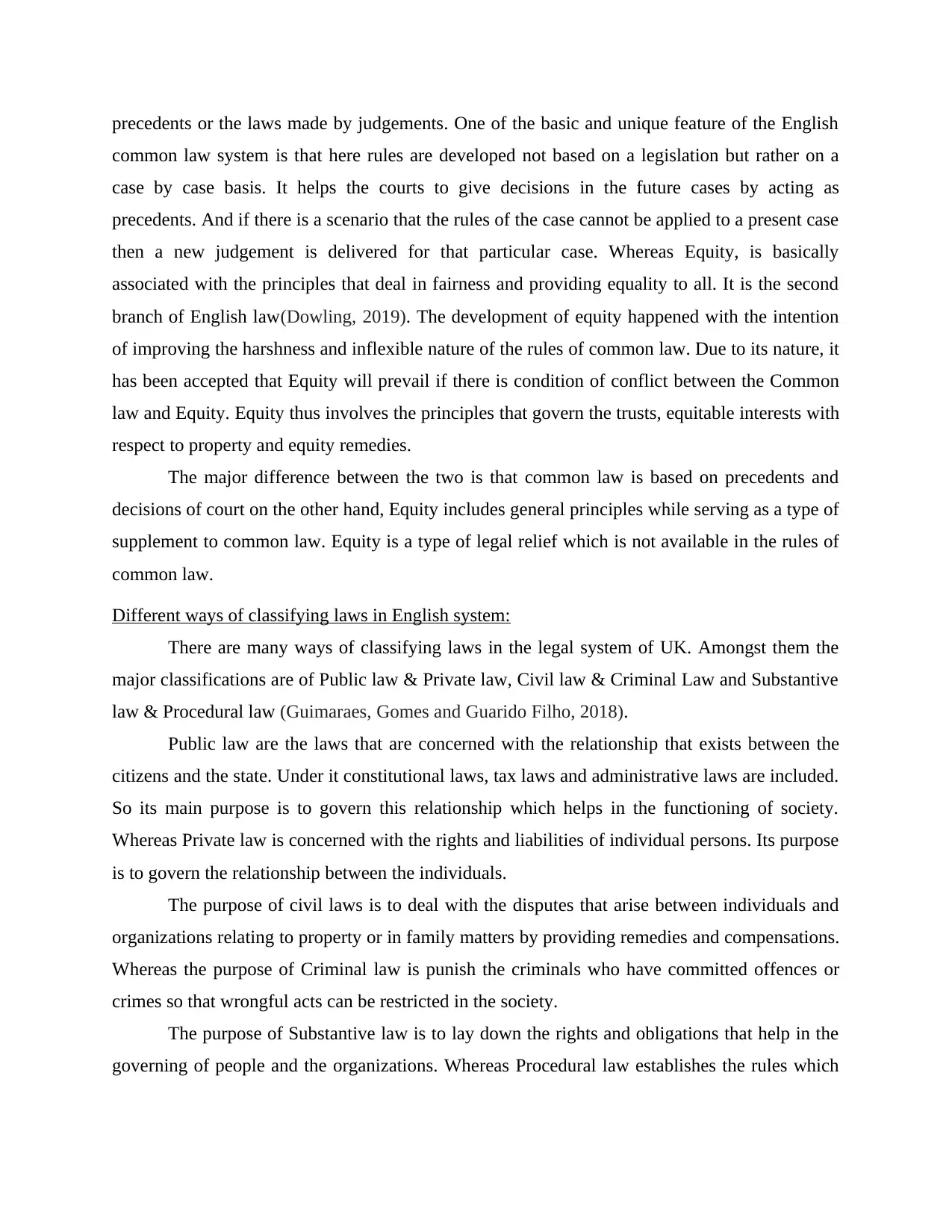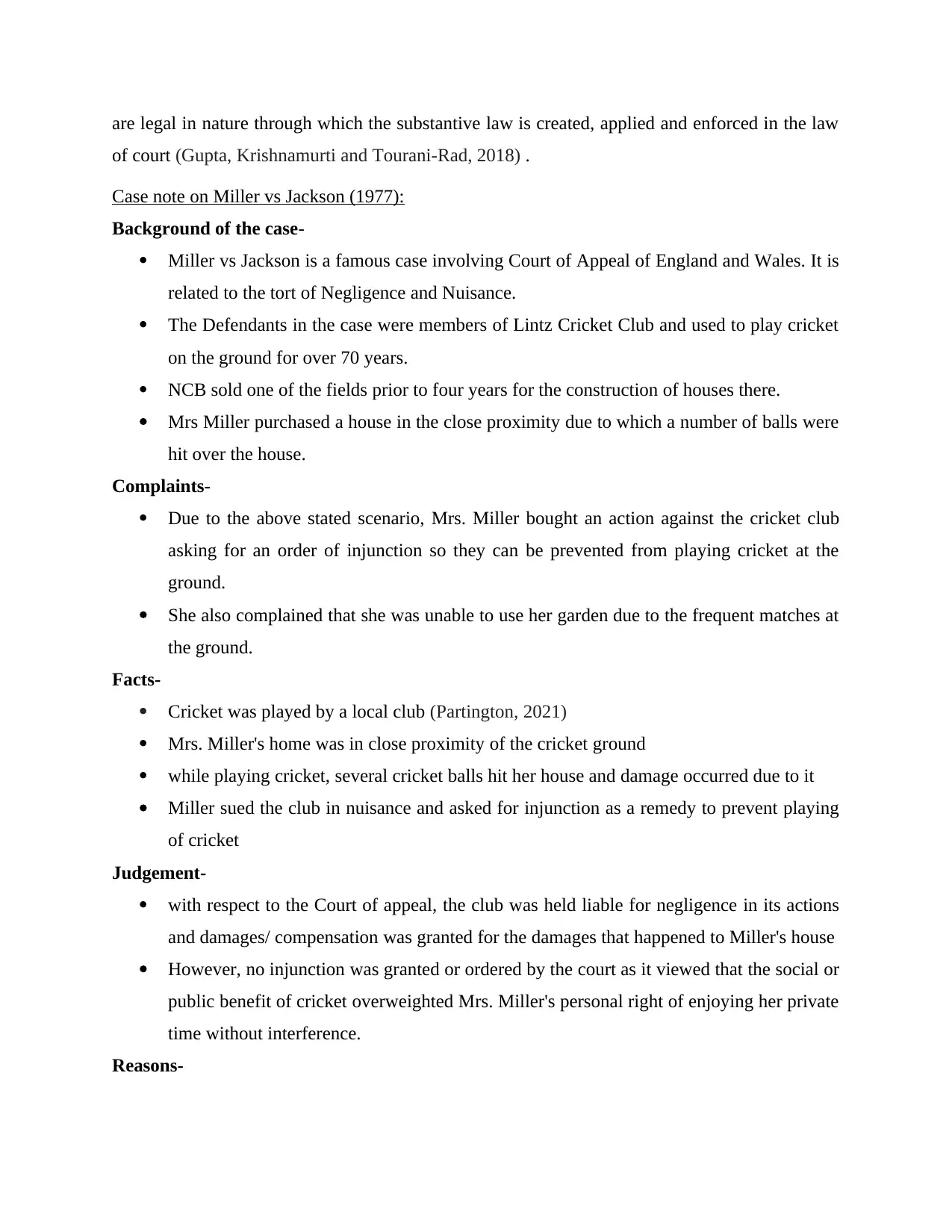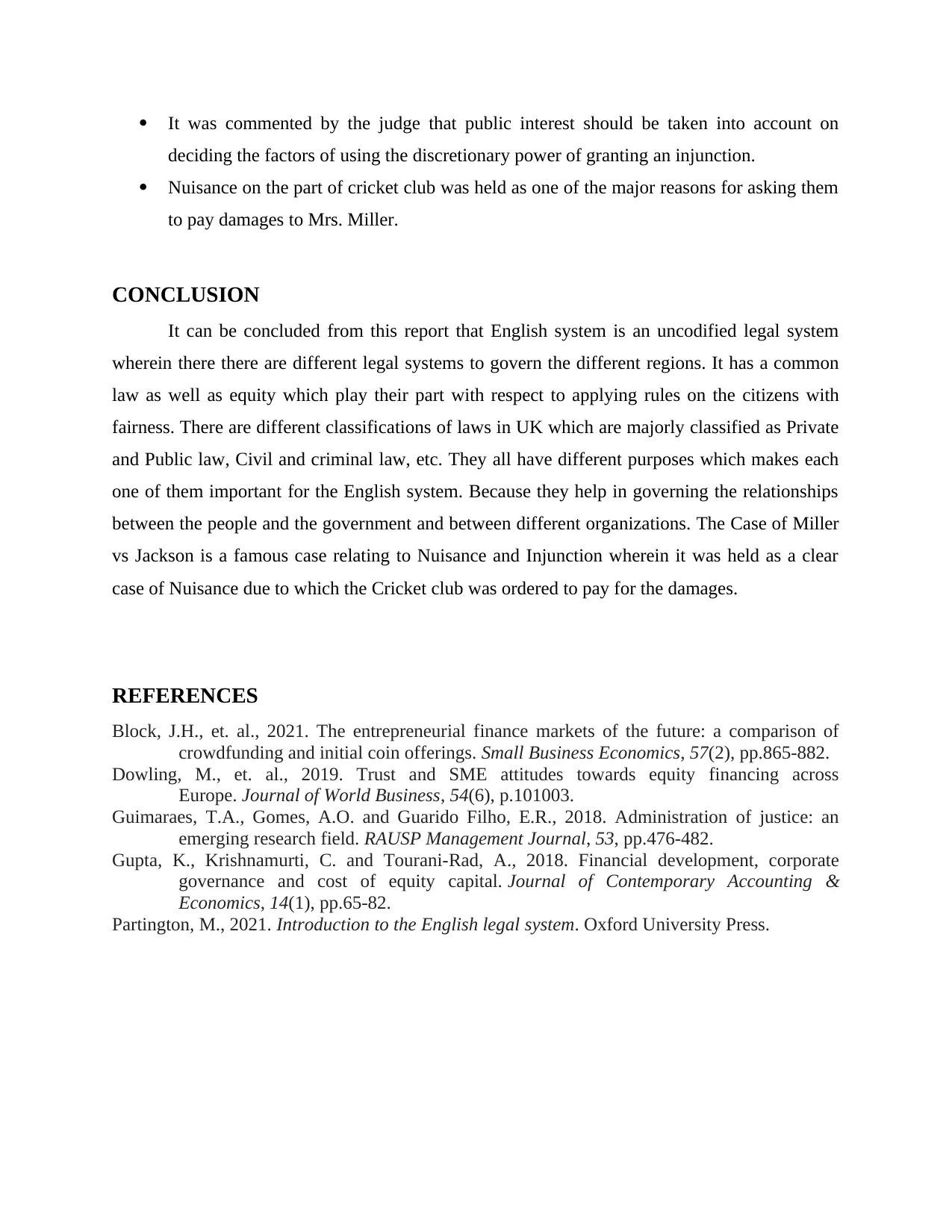Exploring Key Features: Common Law, Equity in the English Legal System
VerifiedAdded on 2023/06/13
|5
|1439
|309
Report
AI Summary
This report provides an overview of the central features of the English Legal System, focusing on the distinction between Common Law and Equity, the different ways of classifying laws, and a case note on Miller vs Jackson (1977). Common law is defined as law created by court decisions, acting as judicial precedents, while equity focuses on fairness and equality, prevailing in conflicts with common law. The report also outlines classifications such as Public vs. Private law, Civil vs. Criminal law, and Substantive vs. Procedural law, highlighting their roles in governing relationships and maintaining order. The analysis of Miller vs. Jackson illustrates the application of negligence and nuisance principles, where damages were awarded but an injunction was denied due to public interest considerations. Desklib offers a variety of resources, including solved assignments and past papers, for students studying the English Legal System.

Central Features of the
English System
English System
Paraphrase This Document
Need a fresh take? Get an instant paraphrase of this document with our AI Paraphraser

Table of Contents
INTRODUCTION ..........................................................................................................................2
TASK ..............................................................................................................................................2
Difference between Common law and Equity:...........................................................................2
Different ways of classifying laws in English system:...............................................................3
Case note on Miller vs Jackson (1977):......................................................................................3
CONCLUSION ...............................................................................................................................5
REFERENCES................................................................................................................................5
INTRODUCTION
English legal system is a framework that defines the relations between the government
and the citizens in UK. The most different and unique feature of the English system is its
Common law heritage. The development of English law is associated with the administration of
justice that began in the western Europe. This gave rise to the civil and common law traditions.
English legal system has different varieties and complexity with respect to principles, institutions
and processes of governance and administering justice to the citizens(Block, 2021) . There is no
single legal system in UK because of the fact that Roman law influence the law of Scotland and
thus it is different from the laws of other regions in UK. There is a centralised structure of court
for the whole country. This report will cover in detail difference between common law and
equity, the classifications of law and case of Miller vs Jackson.
TASK
Difference between Common law and Equity:
Common law and Equity are represented as the forms of branches of law in United
Kingdom. In the English system, Common law is generally referred to as those laws which are
created by the decisions that are given in courts. These are thus referred to as case laws, judicial
INTRODUCTION ..........................................................................................................................2
TASK ..............................................................................................................................................2
Difference between Common law and Equity:...........................................................................2
Different ways of classifying laws in English system:...............................................................3
Case note on Miller vs Jackson (1977):......................................................................................3
CONCLUSION ...............................................................................................................................5
REFERENCES................................................................................................................................5
INTRODUCTION
English legal system is a framework that defines the relations between the government
and the citizens in UK. The most different and unique feature of the English system is its
Common law heritage. The development of English law is associated with the administration of
justice that began in the western Europe. This gave rise to the civil and common law traditions.
English legal system has different varieties and complexity with respect to principles, institutions
and processes of governance and administering justice to the citizens(Block, 2021) . There is no
single legal system in UK because of the fact that Roman law influence the law of Scotland and
thus it is different from the laws of other regions in UK. There is a centralised structure of court
for the whole country. This report will cover in detail difference between common law and
equity, the classifications of law and case of Miller vs Jackson.
TASK
Difference between Common law and Equity:
Common law and Equity are represented as the forms of branches of law in United
Kingdom. In the English system, Common law is generally referred to as those laws which are
created by the decisions that are given in courts. These are thus referred to as case laws, judicial

precedents or the laws made by judgements. One of the basic and unique feature of the English
common law system is that here rules are developed not based on a legislation but rather on a
case by case basis. It helps the courts to give decisions in the future cases by acting as
precedents. And if there is a scenario that the rules of the case cannot be applied to a present case
then a new judgement is delivered for that particular case. Whereas Equity, is basically
associated with the principles that deal in fairness and providing equality to all. It is the second
branch of English law(Dowling, 2019). The development of equity happened with the intention
of improving the harshness and inflexible nature of the rules of common law. Due to its nature, it
has been accepted that Equity will prevail if there is condition of conflict between the Common
law and Equity. Equity thus involves the principles that govern the trusts, equitable interests with
respect to property and equity remedies.
The major difference between the two is that common law is based on precedents and
decisions of court on the other hand, Equity includes general principles while serving as a type of
supplement to common law. Equity is a type of legal relief which is not available in the rules of
common law.
Different ways of classifying laws in English system:
There are many ways of classifying laws in the legal system of UK. Amongst them the
major classifications are of Public law & Private law, Civil law & Criminal Law and Substantive
law & Procedural law (Guimaraes, Gomes and Guarido Filho, 2018).
Public law are the laws that are concerned with the relationship that exists between the
citizens and the state. Under it constitutional laws, tax laws and administrative laws are included.
So its main purpose is to govern this relationship which helps in the functioning of society.
Whereas Private law is concerned with the rights and liabilities of individual persons. Its purpose
is to govern the relationship between the individuals.
The purpose of civil laws is to deal with the disputes that arise between individuals and
organizations relating to property or in family matters by providing remedies and compensations.
Whereas the purpose of Criminal law is punish the criminals who have committed offences or
crimes so that wrongful acts can be restricted in the society.
The purpose of Substantive law is to lay down the rights and obligations that help in the
governing of people and the organizations. Whereas Procedural law establishes the rules which
common law system is that here rules are developed not based on a legislation but rather on a
case by case basis. It helps the courts to give decisions in the future cases by acting as
precedents. And if there is a scenario that the rules of the case cannot be applied to a present case
then a new judgement is delivered for that particular case. Whereas Equity, is basically
associated with the principles that deal in fairness and providing equality to all. It is the second
branch of English law(Dowling, 2019). The development of equity happened with the intention
of improving the harshness and inflexible nature of the rules of common law. Due to its nature, it
has been accepted that Equity will prevail if there is condition of conflict between the Common
law and Equity. Equity thus involves the principles that govern the trusts, equitable interests with
respect to property and equity remedies.
The major difference between the two is that common law is based on precedents and
decisions of court on the other hand, Equity includes general principles while serving as a type of
supplement to common law. Equity is a type of legal relief which is not available in the rules of
common law.
Different ways of classifying laws in English system:
There are many ways of classifying laws in the legal system of UK. Amongst them the
major classifications are of Public law & Private law, Civil law & Criminal Law and Substantive
law & Procedural law (Guimaraes, Gomes and Guarido Filho, 2018).
Public law are the laws that are concerned with the relationship that exists between the
citizens and the state. Under it constitutional laws, tax laws and administrative laws are included.
So its main purpose is to govern this relationship which helps in the functioning of society.
Whereas Private law is concerned with the rights and liabilities of individual persons. Its purpose
is to govern the relationship between the individuals.
The purpose of civil laws is to deal with the disputes that arise between individuals and
organizations relating to property or in family matters by providing remedies and compensations.
Whereas the purpose of Criminal law is punish the criminals who have committed offences or
crimes so that wrongful acts can be restricted in the society.
The purpose of Substantive law is to lay down the rights and obligations that help in the
governing of people and the organizations. Whereas Procedural law establishes the rules which
⊘ This is a preview!⊘
Do you want full access?
Subscribe today to unlock all pages.

Trusted by 1+ million students worldwide

are legal in nature through which the substantive law is created, applied and enforced in the law
of court (Gupta, Krishnamurti and Tourani-Rad, 2018) .
Case note on Miller vs Jackson (1977):
Background of the case-
Miller vs Jackson is a famous case involving Court of Appeal of England and Wales. It is
related to the tort of Negligence and Nuisance.
The Defendants in the case were members of Lintz Cricket Club and used to play cricket
on the ground for over 70 years.
NCB sold one of the fields prior to four years for the construction of houses there.
Mrs Miller purchased a house in the close proximity due to which a number of balls were
hit over the house.
Complaints-
Due to the above stated scenario, Mrs. Miller bought an action against the cricket club
asking for an order of injunction so they can be prevented from playing cricket at the
ground.
She also complained that she was unable to use her garden due to the frequent matches at
the ground.
Facts-
Cricket was played by a local club (Partington, 2021)
Mrs. Miller's home was in close proximity of the cricket ground
while playing cricket, several cricket balls hit her house and damage occurred due to it
Miller sued the club in nuisance and asked for injunction as a remedy to prevent playing
of cricket
Judgement-
with respect to the Court of appeal, the club was held liable for negligence in its actions
and damages/ compensation was granted for the damages that happened to Miller's house
However, no injunction was granted or ordered by the court as it viewed that the social or
public benefit of cricket overweighted Mrs. Miller's personal right of enjoying her private
time without interference.
Reasons-
of court (Gupta, Krishnamurti and Tourani-Rad, 2018) .
Case note on Miller vs Jackson (1977):
Background of the case-
Miller vs Jackson is a famous case involving Court of Appeal of England and Wales. It is
related to the tort of Negligence and Nuisance.
The Defendants in the case were members of Lintz Cricket Club and used to play cricket
on the ground for over 70 years.
NCB sold one of the fields prior to four years for the construction of houses there.
Mrs Miller purchased a house in the close proximity due to which a number of balls were
hit over the house.
Complaints-
Due to the above stated scenario, Mrs. Miller bought an action against the cricket club
asking for an order of injunction so they can be prevented from playing cricket at the
ground.
She also complained that she was unable to use her garden due to the frequent matches at
the ground.
Facts-
Cricket was played by a local club (Partington, 2021)
Mrs. Miller's home was in close proximity of the cricket ground
while playing cricket, several cricket balls hit her house and damage occurred due to it
Miller sued the club in nuisance and asked for injunction as a remedy to prevent playing
of cricket
Judgement-
with respect to the Court of appeal, the club was held liable for negligence in its actions
and damages/ compensation was granted for the damages that happened to Miller's house
However, no injunction was granted or ordered by the court as it viewed that the social or
public benefit of cricket overweighted Mrs. Miller's personal right of enjoying her private
time without interference.
Reasons-
Paraphrase This Document
Need a fresh take? Get an instant paraphrase of this document with our AI Paraphraser

It was commented by the judge that public interest should be taken into account on
deciding the factors of using the discretionary power of granting an injunction.
Nuisance on the part of cricket club was held as one of the major reasons for asking them
to pay damages to Mrs. Miller.
CONCLUSION
It can be concluded from this report that English system is an uncodified legal system
wherein there there are different legal systems to govern the different regions. It has a common
law as well as equity which play their part with respect to applying rules on the citizens with
fairness. There are different classifications of laws in UK which are majorly classified as Private
and Public law, Civil and criminal law, etc. They all have different purposes which makes each
one of them important for the English system. Because they help in governing the relationships
between the people and the government and between different organizations. The Case of Miller
vs Jackson is a famous case relating to Nuisance and Injunction wherein it was held as a clear
case of Nuisance due to which the Cricket club was ordered to pay for the damages.
REFERENCES
Block, J.H., et. al., 2021. The entrepreneurial finance markets of the future: a comparison of
crowdfunding and initial coin offerings. Small Business Economics, 57(2), pp.865-882.
Dowling, M., et. al., 2019. Trust and SME attitudes towards equity financing across
Europe. Journal of World Business, 54(6), p.101003.
Guimaraes, T.A., Gomes, A.O. and Guarido Filho, E.R., 2018. Administration of justice: an
emerging research field. RAUSP Management Journal, 53, pp.476-482.
Gupta, K., Krishnamurti, C. and Tourani-Rad, A., 2018. Financial development, corporate
governance and cost of equity capital. Journal of Contemporary Accounting &
Economics, 14(1), pp.65-82.
Partington, M., 2021. Introduction to the English legal system. Oxford University Press.
deciding the factors of using the discretionary power of granting an injunction.
Nuisance on the part of cricket club was held as one of the major reasons for asking them
to pay damages to Mrs. Miller.
CONCLUSION
It can be concluded from this report that English system is an uncodified legal system
wherein there there are different legal systems to govern the different regions. It has a common
law as well as equity which play their part with respect to applying rules on the citizens with
fairness. There are different classifications of laws in UK which are majorly classified as Private
and Public law, Civil and criminal law, etc. They all have different purposes which makes each
one of them important for the English system. Because they help in governing the relationships
between the people and the government and between different organizations. The Case of Miller
vs Jackson is a famous case relating to Nuisance and Injunction wherein it was held as a clear
case of Nuisance due to which the Cricket club was ordered to pay for the damages.
REFERENCES
Block, J.H., et. al., 2021. The entrepreneurial finance markets of the future: a comparison of
crowdfunding and initial coin offerings. Small Business Economics, 57(2), pp.865-882.
Dowling, M., et. al., 2019. Trust and SME attitudes towards equity financing across
Europe. Journal of World Business, 54(6), p.101003.
Guimaraes, T.A., Gomes, A.O. and Guarido Filho, E.R., 2018. Administration of justice: an
emerging research field. RAUSP Management Journal, 53, pp.476-482.
Gupta, K., Krishnamurti, C. and Tourani-Rad, A., 2018. Financial development, corporate
governance and cost of equity capital. Journal of Contemporary Accounting &
Economics, 14(1), pp.65-82.
Partington, M., 2021. Introduction to the English legal system. Oxford University Press.
1 out of 5
Related Documents
Your All-in-One AI-Powered Toolkit for Academic Success.
+13062052269
info@desklib.com
Available 24*7 on WhatsApp / Email
![[object Object]](/_next/static/media/star-bottom.7253800d.svg)
Unlock your academic potential
Copyright © 2020–2025 A2Z Services. All Rights Reserved. Developed and managed by ZUCOL.





